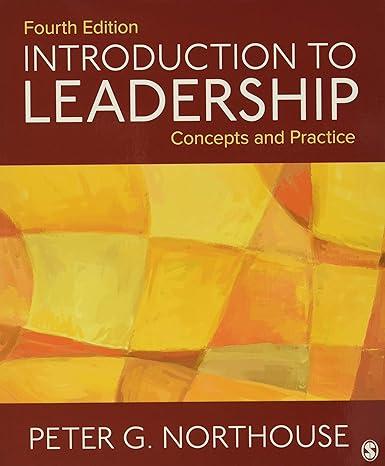Christine Jorgens was shocked when the board of Begin the Future Foundation, the nonprofit organization she worked
Question:
Christine Jorgens was shocked when the board of Begin the Future Foundation, the nonprofit organization she worked for, asked her to apply for the position of CEO of the organization. For 40 years, Begin the Future Foundation had provided programs in a nine-county region to help children living in poverty in urban and rural areas succeed in school and life, and the CEO’s job was a big one.
Christine had never aspired to be a CEO. She had grown up on a small farm in a rural area, one of seven children in a family that struggled financially. In high school, she worked at a local restaurant, first as a dishwasher and then as a waitress, continuing to work there while she attended college studying social work.
In her senior year of college, she landed an internship at Begin the Future Foundation overseeing an afterschool program for middle school students. Christine ended up working for Begin the Future Foundation for 12 more years, with many of her colleagues joking that she was “the intern who never left.” Friendly and approachable, she eagerly took on whatever work the organization had for her to do. She worked as a receptionist, became a grant writer, helped out in public relations and marketing, and then was given a position developing and initiating new programs and working with donors to fund those programs.
She thrived at program development, finding ways to implement community resources that were often overlooked. Her program, Study Buddies, paired up volunteer tutors from a local college with children to meet three times a week for a half-hour of tutoring followed by a half-hour of recreation and games.
Christine also initiated Girl Power, a program allowing middle school girls to spend an afternoon each week shadowing a local female professional or businesswoman who worked in a career that they were interested in pursuing.
Christine’s enthusiasm was contagious, especially with donors. Her programs were all successfully funded, and potential donors often approached Christine with ideas they had for new initiatives that they were willing to fund.
But despite all her successes, Christine wasn’t sure she was CEO material. She saw herself as a local girl who had lucked into some great opportunities. The board had been clear about what credentials a new CEO must have: strategic thinking, experience running a nonprofit organization, ability to work with people on all levels of society from the poorest to the richest, ability to manage people, and a commitment to the organization’s mission of helping kids escape poverty. Christine didn’t have direct experience overseeing a nonprofit and felt she needed more experience in the day-to-day management of the organization.
At the suggestion of the board members, she took a strengths assessment and learned her strengths were in strategic planning, relationship building, creativity, compassion, and influencing. In addition, the board members pointed out that she had a deep knowledge and commitment to the organization and the children they served. Despite Christine’s hesitancy, the board was convinced Christine was the right candidate.
Questions
1. Strengths are considered inborn traits that can be enhanced with experience. What experiences in Christine’s background helped her develop her strengths?
2. Of the strengths identified by the assessment, which were directly observable in Christine’s work?
Were there any that were not?
3. Christine admitted having some weaknesses, especially in day-to-day management of the organization. Which of her strengths could she put into use to help her deal with that, and how?
4. What strengths should Christine seek from others that would complement her own and fill some gaps?
Step by Step Answer:

Introduction To Leadership Concepts And Practice
ISBN: 9781506330082
4th Edition
Authors: Peter G. Northouse





